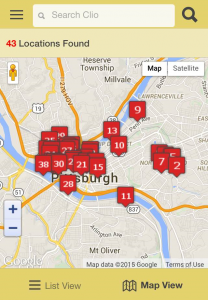© Clio
Equal parts guidebook, GPS locator, and crowdsourced data platform, Clio is an app designed to help you discover local history. Named after the ancient Greek muse of history, Clio uses your location to provide information about nearby historical and cultural sites. Whether you’re a hardcore history buff or are just looking to get to know your city a little better, the network of professional and amateur contributors at work on improving Clio can point you to the important, unique, or just plain weird historical features of a city. You can also add your favorite historical sites to the map for everyone to see!
For new residents, Clio could help you catch up on your Pittsburgh history in no time. While on the Chatham campus, I found 43 sites within 10 miles of the JKM Library. Although there were a handful outside of the city proper, most were concentrated within an area easily navigable on foot or using public transit. Beyond addresses and navigational content, entries tended to provide a robust about of information about individual sites; the records that I previewed included detailed historical descriptions (occasionally including citations), images, hours of operation, contact information, and links to outside resources.
 In addition to currently operational historical sites such as monuments, historic buildings, and museums, Clio includes “Time Capsule” entries that point to sites where things happened or—particularly relevant to Pittsburgh—where things used to be. A pin at 6th and Wood downtown, for example, identifies it as the site of a “Protest Against Gimbels Department Store, 1935,” while another pin on South Bouquet Street marks the location of the former Forbes Field. Whether you happen to be roaming the city or would like to plan your own historic Pittsburgh outing, Clio could be a useful tool for finding the hidden history all around the city.
In addition to currently operational historical sites such as monuments, historic buildings, and museums, Clio includes “Time Capsule” entries that point to sites where things happened or—particularly relevant to Pittsburgh—where things used to be. A pin at 6th and Wood downtown, for example, identifies it as the site of a “Protest Against Gimbels Department Store, 1935,” while another pin on South Bouquet Street marks the location of the former Forbes Field. Whether you happen to be roaming the city or would like to plan your own historic Pittsburgh outing, Clio could be a useful tool for finding the hidden history all around the city.
Users can create accounts to help build the site database by adding and revising entries. All additions are subject to verification and approval, but the review process seems fairly transparent as revisions (even those by Clio administrators) are displayed in a change log at the bottom of the entry. According to the FAQ, entries are published under a Creative Commons license that acknowledges the creator.
Because you can either search for a location or allow the app to use your GPS coordinates, Clio would work well both for travelers and for local exploration. In its best formulation, this crowdsourced data model could lead to some degree of local flair in terms of the sites included and their descriptions—after all, there’s no better way to learn about a city than from the people that live there!
Available for iOS and Android, and on the web.

